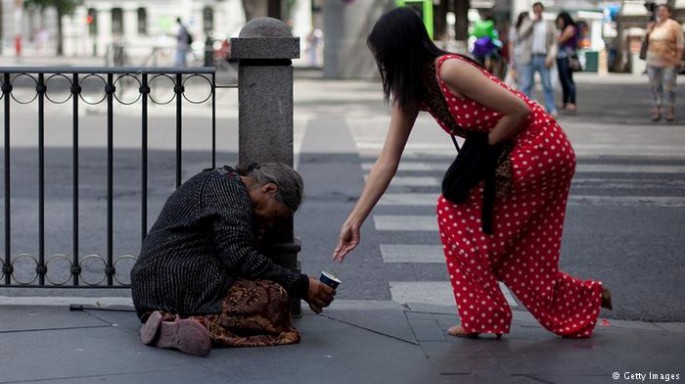Poverty remains high in Germany among single parents, the jobless and elderly despite solid economic data, say social welfare groups. Low-skill workers have become disconnected from economic success.
Germany's "Paritätische" federation, representing 10,000 social welfare groups, warned Tuesday that nearly one in six of Germany's residents remained at risk of being trapped in relative poverty.
The term used across the EU refers to anyone, child or adult, who lives on less than 60 percent of the medium income as measured statistically. In Germany, that threshold is 917 euros ($1,015) per month for a single person and 1,192 euros ($1,310) for a single parent with a child under six.
Experts said the results overall continued to point to massive inequality in German society, despite glowing data such as Tuesday's announcement that export-driven Germany last year recorded its highest federal budget surplus since reunification, and despite its taking in one million refugees.
One-in-six below poverty line
In its latest summary, based on figures from 2014, the Paritätische said 15.4 of the population nationwide was stuck below the poverty line.
That was down a slight 0.1 percent on the level measured it 2013, but still up significantly on the 14 percent measured ten years ago, it said.
Highlighting child poverty, the federation said 19 percent of Germany's youngsters lived in relative poverty. Half of these were children living in a single-parent household.
And, at 15.6 percent, poverty among pensioners had for the first time risen above the nationwide average.
One-in-five Ruhr residents impoverished
Relative poverty had climbed to a record 20 percent in North Rhine-Westphalia's Ruhr District, once the motor of German heavy industry and now the scene of economic and urban redevelopment efforts.
Among Germany's 16 federal states or "Länder", poverty risk had declined in the city-state of Berlin and Mecklenburg-East Pomerania in northeastern Germany, the Baltic coast region that was once part of communist East Germany.
Deutschland Dr. Dorothee Spannagel
Despite record employment, poverty had not declined, said Dorothee Spannagel, a social expert who analyzed poverty trends for the trade union-affiliated Hans-Böckler Foundation.
She told the German news agency DPA that the gap in Germany between poor and rich continued to widen.
Spannegel said the so-called low wage sector involving menial jobs had become disconnected from overall economic gains. In addition, there had been a surge in individuals earning from their capital investments.
See more at:
DW





